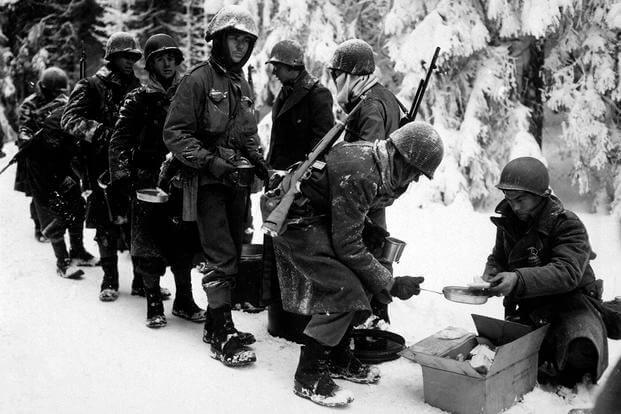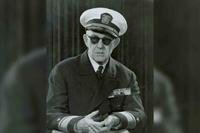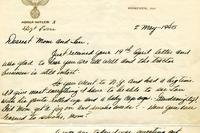Bio
Frederick "Mike" Carmichael grew up in Newcastle, Ind., and worked before and after school from junior high through high school as a meat cutter in a butcher shop. After high school, he took the Civil Service exam and got a job as a federal meat inspector in Chicago.
He was 19 when he was drafted on Feb. 8, 1943, and went to basic training at Camp McCain in Grenada, Miss., where soldiers were being trained for jungle warfare in the South Pacific. At the end of basic training, the rest of the company went to the Pacific, while Carmichael stayed on as an instructor at Camp McCain. They went on maneuvers in Tennessee in the winter of 1943 after replacements arrived to round out the company at 188. That group also headed to the Pacific after the Tennessee maneuvers. Company F then went to Fort Jackson and next was stationed on "tank hill."
Eventually, Carmichael found himself a sergeant in the 87th Infantry Division, 347th Infantry Regiment, Company F, part of Patton's Third Army in Europe.
Here is Carmichael's story in his own words.
To get full strength in the units, the Army broke up the Army Specialized Training Program (ASTP) in the summer of 1944 because they were running out of men because the Army had gone through D-Day and the hedgerows in France. The guys in the ASTP were at colleges. They broke that up and they all went to divisions. We got some of them.
We were alerted in October 1944 and went to Camp Kilmer, N.J., got our shots and got on the Queen Elizabeth to sail across the Atlantic. Four and a half days later, we landed at Gaurrock, Scotland. Traveled by rail to Cheshire County, England, where we stayed in British homes. We'd march down into the city for chow morning, noon and night. The reason we were there is we were waiting for our equipment to catch up with us. We were there about three weeks. My biggest memory of England was not being able to have showers. Enjoyed going to Manchester. I liked the pubs with the dart room in the front, double-decker buses, and thatched roofs.
Left England by boat and landed at Le Havre the 27th of November. When we got to Southhampton to get on the boats, the gun emplacements were still in the walls and there were some ship masts sticking up in the harbor.
In France, we spent the first night in an apple orchard. We didn't have combat boots. We had regular GI shoes, and they issued us four-buckle Arctics [rubber overshoes], which were hard to run in.
We went by truck and train to near Metz. The 5th Division had taken Metz. We then went to the Saar basin. We took the first town in Germany — Walsheim. Sat there and they didn't tell us anything. Dec. 22 and 23, the company commander was called back to the battalion and was told to bring the troops back where the 44th Division had dug in and straightened the line.
On Dec 24, 1944, I went to midnight mass in the church with lighted candles with the local people there. Christmas Day, we were put on 10-ton trucks and rushed to Reims, France, where I had my first shower in 93 days. They had a tent on either side of a big truck. There were about 10 showers on either side. You undressed and ran up the stairs, and they blew a whistle and turned on the water. Then they shut it off. You soaped up, and then they blew a whistle and the water started again and you rinsed off. When you came out the other side, you got new clothes. We also got replacements at this time.
Went back to the woods and put us in trucks and took us to [a supply point] and let us out and told us "whatever you take, you hold." We still didn't know it was the Battle of the Bulge. All night long, I laid near a jeep. The sky was lit up with artillery, but nothing fell on us.
We went through and took Moircy. Took Jenneville. There our objective was to cut the road junction between St. Hubert and Bastogne because it was the only road the Germans could get their supplies in on. It was almost impossible because the Germans had the 88s [88mm artillery guns]. The weather was cold, with snow up to your knees. My company attacked on the right side of the road up on a hill. We started over the hill. One of our platoons made it over the hill, and when we started over the hill, all hell broke loose with machine-gun fire and rifle fire, and we stayed behind the hill. I got in a three-sided shed with the company commander and artillery officer. We couldn't get across the draw. So the company commander told me to get one of our messengers since I was the communications sergeant. We communicated with messengers, radios and by airplane panels.
I got [the messenger] Sedcheck, and he went to get a BAR [Browning automatic rifle] team to knock out those snipers. The snipers were up there safe. He got about halfway through the draw and our own artillery got him. They were going to get marching fire in front of our position. We were supposed to advance behind it, and this was the only time it happened. The company commander got on the radio and raised hell with the artillery and yelled, "Raise your fire, raise your fire, you're firing on your own troops!" Then it was over, and the CO said to me, "Come on, Mike, let's go" … So he went across first and got across. It was about 30 yards or so across, and I started across. And just as I got to where Sedcheck was, I could hear the bullet before I could hear the report of the rifle. And I dropped in the hole with Sedcheck, and there wasn't enough room for both of us, so I ran like hell. I hit the other side of the bank. The company commander had already had some of the guys with BARs take out the sniper. We were there because we couldn't get into the woods — Tillet woods. E Company went into Pironpre and took it. There's a river runs through there. That night, I decided we should dig in over the top of the hill in a little wooded area. During the night, E Company got kicked out of town, so when morning came, all at once we got small-arms fire. Now, we were lying in the snow like we were in caskets because you could see where we were, lying in the indentations in the snow. Sgt. Dunn down below me got shot in the leg and he hollered, and the company commander asked him if he thought he could get up, and he said he could. He got up and got over the hill. The company commander said, "Let's go," and I got up and got out. Then he got up and got out, no problem. We stayed over the hill four days and tried each day to get into the woods and we couldn't. We stayed until the seventh of January and [they] pulled us back so another outfit could pull up.
At the same time, I lost a filling in one of my teeth, and that cold air caused a lot of pain. They put me in a chair, and the dentist came in and worked on my tooth. They used a drill hooked up to a bicycle. One guy pedaled the bike to power the drill, and the dentist put in a temporary filling. It lasted until I got home after the war.
Then I went back to the unit, and we finally got through on the 11th of January. Now, in Pironpre, D [and] E companies were in there, and finally F Company took it. We cleared out the woods, and what we found out there was a monastery down the road, and we didn't know if the Germans were using it to operate from. Great big monastery. We finally got to it. Lt. Kessler from C Company was up in another building and a Tiger tank came up to the crossroad, and Kessler took his bazooka and fired point blank and it just bounced off. They turned the 88mm on him and blew the wall right in on top of him. When we came through two days later, I went up in the room and there he was with his sergeant — both of them were killed with brick embedded in their faces. Kessler still had his carbine strapped on his shoulder.
Then we went on up to the monastery, and the Germans had blown down all the trees across the roads so our tanks couldn't get through. We had to crawl over those in snow up to [our] knees. Black bread was everywhere at the monastery. There were bodies in the courtyard. They had the tanks first and the infantry second. They'd put the dead and wounded on the tanks and take them along with them.
Left the monastery and went to Amberloup, met the British army and went to Houffalize and took it. That was about the end of the Bulge. We really had them cleared out by the 25th of January. Then we headed for the river and still had German contact. They were pulling back to the Siegfried line now, and when we'd get to a little town, there'd be about 10 Germans holding it, and they'd either fight or give up. There was a die-hard in one of the towns that shot and killed one of our men. Of course, he didn't get out. We killed him. Most of them would come out with their hands up. We went to the Saar River by foot and by truck.
Patton's idea was you don't hold a damn thing. You don't hold nothing. You keep going. We'd take a town, and I'd cut all the communications wires. Then we'd get the order to move to the next town. Sometimes, it would be four or five in the afternoon and we'd be given an order to go to another town. It was hard on the troops.
Then we went north to the Ourthe River. We were to relieve the 17th Airborne Division. We did this at night. There was some shelling, and we used their holes. The company commander got called to a meeting, and the word came down that we were supposed to move. When we got up in the morning, we saw that everyone else was gone. Only 12 or 15 men were left. A messenger came and told us, and we went down the road and it was hilly ground. We almost got down to the town and shells started hitting over to the right of us. We ran like hell into town. I went into a house, and just then a Catholic priest came along in a jeep and came in and jumped in the hallway with me. After the shelling was over, we went out and a shell had landed behind his jeep ... We stayed there, and it was mostly sending patrols out. It was a holding position. From there, we went to the Siegfried line. Then we started at Auw, Germany. There was no problem there. I got a German flag there. We went to Weckerath. There was a big hill and we were going down it, and all of a sudden, we got artillery fire. We hugged the ground while machine-gun fire was all around us. We finally got the machine-gunner.
We had to cross the river. Artillery observer put fire on the town because there was movement of machines in it all afternoon. At night, we decided to take it at night. We went across the stream and my radio operator lost his helmet. The company commander's idea was to send in a platoon from either end, and there'd be a password. We had to give a password or we'd be shot.
Meantime, we started getting time fire. It was hitting just below us. The heavy weapons platoon was below us, and one man had his leg cut off. Then a dud came in right next to us and really shook the ground. We went in a house, and there was a dead woman in bed and in the kitchen were four or five men. The company commander asked them who they were, and they said, "French, French." My company commander pulled out his .45 and told them to get their equipment. They were German soldiers. He saw their shoes and it gave them away.
Then we cleared out the town. Then we went to Krewinkel [and] there we got held up. We were sweating out who was going to take the Siegfried line — which regiment. We took a platoon up near the dragon's teeth [a series of fortifications that ran the length of the Siegfried line]. They were cut off during the day.
One night we're in a house and they shelled us, and I laid in the center hallway of the house, and the first sergeant came and kicked me and said, "Get up Mike, the phones are out." So I looked down on the floor and chose Winkles from Alabama. He wasn't scared of nothing. I was scared all the time.
Took Winkles, and we had to take the wire in our hands, trace it along, and crossed a little stream. And you could see the artillery lighting up the sky all over, not hitting our area. We finally got there and had taken an extra roll of wire. So we get up there, and guess what? They're both asleep in the hole. They'd turned off the ringer. They took the batteries out of the one from battalion as well. We put two lines in then.
They had English-speaking Germans on bicycles coming in. They spoke fluent English. These Germans were supposed to confuse the Americans by giving them false information.















